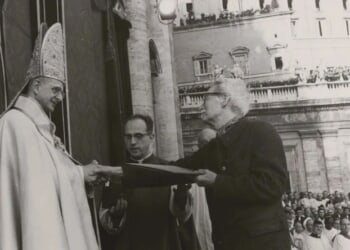Liam Neeson was once a force of nature. Not loud. Not flashy. But resolute. His roles drew power from restraint, from the depth of conviction behind each movement. When he stepped into frame, the film’s tone shifted. He earned attention, and viewers leaned in.
In Schindler’s List, he wasn’t just portraying a man wrestling with conscience. He carried the unbearable weight of history. In Michael Collins, he didn’t perform Irish rebellion. He wore it, embodied it, with all its fury and fractured hope. As Qui-Gon Jinn, he lent a dying franchise gravitas it hadn’t earned. In The Grey, he stood toe-to-toe with mortality, stripped of everything but instinct and despair. And in Silence, he brought the agony of faith to life without a raised voice. Each role was anchored in something real: sacrifice, loss, moral cost.
Those performances weren’t mechanical. They didn’t come from playing himself over and over again. They came from real work — studying, stretching, stepping into the skin of men entirely unlike himself. Every role felt specific. Measured. Grounded in purpose. There was a reason he moved the way he did, spoke the way he spoke. Nothing was accidental.
That discipline is gone now.
What remains is a career stitched together by obligation and inertia. Neeson still appears on screen. He still speaks with that gravelly voice, but the weight is missing. The precision. The interiority. He’s not playing characters anymore. He’s recycling templates.
Just look at the output: Cold Pursuit, Blacklight, Retribution, Memory, The Marksman, Marlowe. Interchangeable roles. Interchangeable posters. Each built on the same skeleton: a man with a past, a daughter or wife in danger, a gun, a car, a countdown. The plots blur because there’s no emotional core to distinguish them. There’s no risk.
Once, Neeson chose directors like Steven Spielberg, Neil Jordan, Martin Scorsese — filmmakers who challenged him, who brought out the philosopher beneath the brawn. Today, he’s handed off to hired guns directing cinematic slop for tax incentives and streaming deals. Not because he has to, but because he no longer seems to care.
His latest, Ice Road: Vengeance, is a perfect example. The title sounds fake. The premise thinner still: he’s a trucker with a box of ashes and a pistol. That’s it. No complexity. No drama. Just mileage and bullets. There’s no arc, no cost, no human tension — just noise, calibrated for minimal attention spans and overseas licensing.
This isn’t about one bad film. It’s a pattern. A conscious decision to slide into mediocrity and stay there. The man who once transformed silence into power now fills space with empty gestures, blank stares, and lines so stale they make fortune cookies sound profound.
Now, stack that against Nicolas Cage. A man who also veered off course, but refused to stay lost. Cage leaned into the madness, gambled on the bizarre, and clawed his way into a new kind of relevance. Pig was raw poetry. Mandy was pure psychedelic rage. Dream Scenario was hauntingly clever. His latest, The Surfer, proves he’s still committed to making films that challenge the audience and respect their ability to handle discomfort, ambiguity, and something other than ridiculous revenge plots. Cage hit rock bottom, but he never gave up. Neeson never spiraled. He coasted. He is, in many ways, apathy in motion.
Worse still, the industry enables it. Streaming platforms love the predictability. He brings name recognition without the hassle. There’s no need for a story worth telling — just a face that sells. And Neeson obliges, again and again. Long-time fans feel it, even if they can’t articulate it. They remember the man who once embodied dignity, who made even the smallest roles feel lived in. Now he’s become another grayscale thumbnail on a digital queue — just enough to click, never enough to remember.
His legacy is evaporating — not because of scandal or failure, but because of repetition. Each phoned-in performance chips away at what once made him special. Neeson has become a case study in what happens when an artist stops demanding more of himself. Once a towering force of cinema, he’s now little more than a dollar-store John Wick in a high-vis vest.
The roles he once chose required stamina, intelligence, vulnerability. The ones he chooses now require only presence, and even that feels outsourced. This should matter. Not just to critics or film nerds, but to anyone who believes art deserves effort.
He owes us better. He owes himself better. Because once you’ve carried films that shaped culture, you don’t get to vanish into obscurity without it meaning something.
You become the warning. The cautionary tale. A reminder that great talent comes with responsibility, and that abandoning it is a form of artistic suicide.
READ MORE by John Mac Ghlionn:


![Former Bravo Star Charged After Violent Assault Using a Rock-Filled Sock in Tennessee Walmart [WATCH]](https://www.right2024.com/wp-content/uploads/2025/07/Former-Bravo-Star-Charged-After-Violent-Assault-Using-a-Rock-Filled-350x250.jpg)



![Karoline Leavitt Levels CNN's Kaitlan Collins and Other Legacy Media Reporters [WATCH]](https://www.right2024.com/wp-content/uploads/2025/07/Karoline-Leavitt-Levels-CNNs-Kaitlan-Collins-and-Other-Legacy-Media-350x250.jpg)
![Man Arrested After Screaming at Senators During Big Beautiful Bill Debate [WATCH]](https://www.right2024.com/wp-content/uploads/2025/06/Man-Arrested-After-Screaming-at-Senators-During-Big-Beautiful-Bill-350x250.jpg)

![Illegal Alien Walked Free After Decapitating Woman, Abusing Corpse for Weeks [WATCH]](https://www.right2024.com/wp-content/uploads/2025/07/1753013138_Illegal-Alien-Walked-Free-After-Decapitating-Woman-Abusing-Corpse-for-350x250.jpg)






